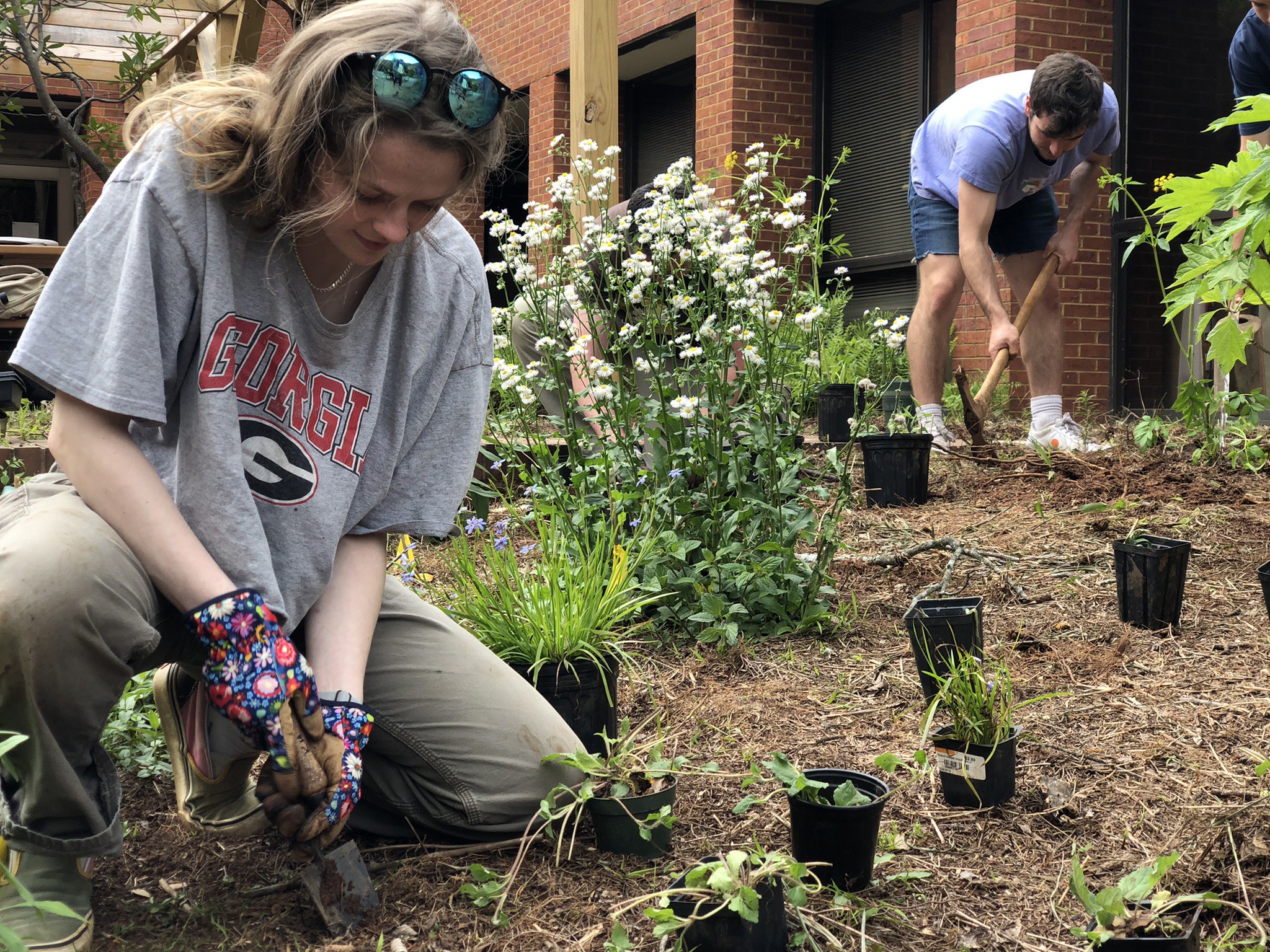If you stepped into the Ecology courtyard this summer, you may have noticed some new additions: Philadelphia fleabane, golden Alexander, blue-eyed grass, and mealycup sage are just some of the native plants in the pollinator garden that now surrounds the plaque commemorating the 20th anniversary of the Conservation Ecology and Sustainable Development program. The garden is the work of the “Quad Squad,” a group of students from the undergraduate Environmental Practicum.
“The purpose of this class is to apply the things you’ve learned during your ecology degree—relating to biodiversity loss, ecosystem services, ecosystem function—to address local problems,” said Assoc. Prof. Richard Hall.
The Environmental Practicum is one of two service-learning courses for ecology undergraduates—the other is Urban Ecology—that are modeled on the interdisciplinary graduate level Environmental Practicum established by Laurie Fowler, Senior Public Service Associate Emerita. They allow students to gain experience by working on environmental problems brought to the class by community organizations.
“The goal is to meet stakeholder needs while meeting learning outcomes,” said Lecturer Alli Injaian, who teaches Urban Ecology.
According to Hall, who co-teaches the Environmental Practicum with lecturer J.P. Schmidt, PhD ’06, those outcomes include transferable skills such as working in teams, meeting deadlines, and communicating effectively with a diverse group of stakeholders with different roles and priorities. And based on their final presentations, that is exactly what happened for the 17 ecology students enrolled in the spring 2022 class.
The Practicum Model
Students in the Environmental Practicum form teams and select from a slate of projects presented by local stakeholders at the beginning of the semester. For spring 2022, the Athens-Clarke County Sustainability Office proposed projects focused on improving environmental conditions and awareness around Dudley Park and the North Oconee River Greenway. The University of Georgia Office of Sustainability asked for help in making the UGA campus a better place for pollinators. And the Odum School itself proposed the renovation of the ecology building courtyard to create a diverse and educational native plant garden.
Early in the semester, the groups spend time brainstorming with stakeholder representatives to come up with goals, deliverables, and timelines. After the initial planning period, the class becomes more hands-on, with weekly work days and regular check-ins with faculty and stakeholders. The semester wraps up with each group giving a presentation about their project and reflecting on what they accomplished, what they learned, and how future classes might build on their work.
Plants, Pollinators, and Parks
Although each of the spring 2022 projects was distinct, there were some common denominators. All four involved using native plants to restore and improve habitat for pollinators and other wildlife. Each project also included a public outreach component.
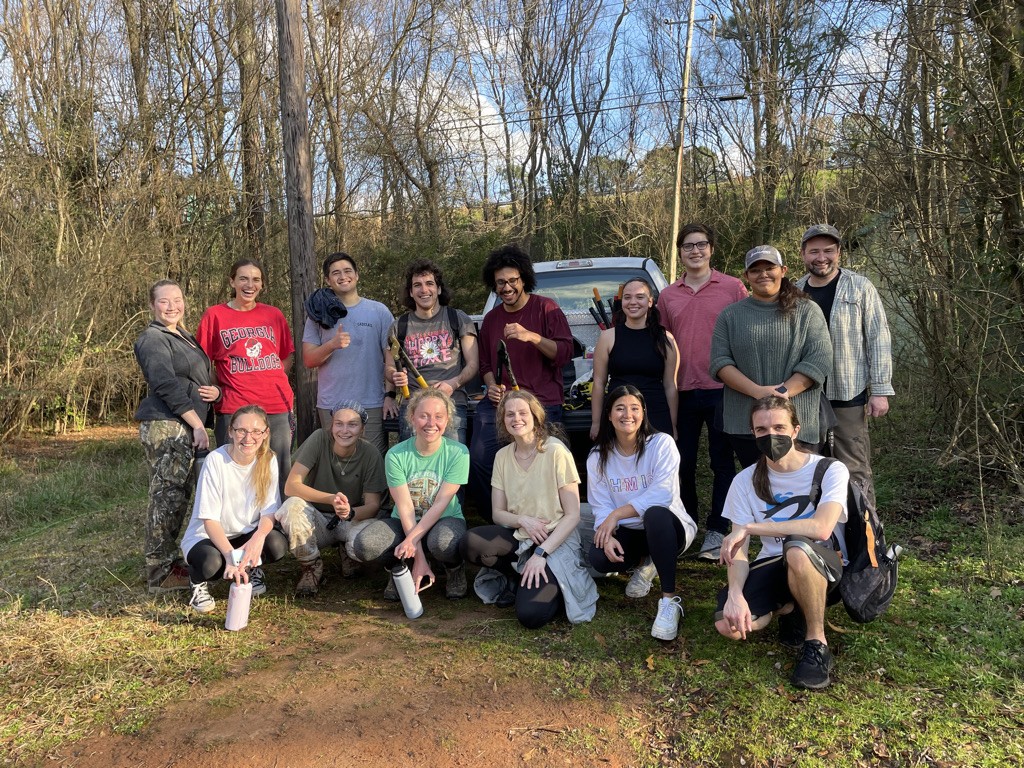
One group, the “Dud Buds,” collaborated with the ACC Sustainability Office to improve conditions for pollinators in Dudley Park. The group planted native grasses along the banks of a creek that had been previously cleared of English ivy. In drier areas they planted wildflowers like big-leaf aster.
“Our goal was to foster local pollinator populations through native plantings and to create an interpretive sign highlighting how native plants and pollinators improve the habitat around them,” said team member Mikey Fager, AB ’22.
“Interpretive signage is different from informational signage,” explained team member Thea Genet. “There’s a little bit more artwork, it’s easier for younger people to read, it gives educational inspiration.”
The Dud Buds agreed that the most valuable skills they gained included the ability to communicate with their stakeholders and the flexibility that they learned from having to adapt to unexpected changes of plans.
Another group worked with ACC Sustainability to address habitat and streambank restoration, littering in public areas, and soil erosion. They focused on Dudley Park and the MLK Greenway section of the North Oconee River Greenway. The group planted native grasses like river oats to restore riparian areas and help slow erosion along the North Oconee River. They also picked up litter along the Greenway and cleaned out the Trail Creek trash trap—a device that captures floating trash like plastic and Styrofoam in a large basket that can then be emptied— netting over 36 pounds of waste materials.
Both groups coordinated on hosting an informational table at the local Green Life “Hoppy Hour” event, held on Earth Day in Athens, to showcase their projects and promote native plants and pollinators to the public. “An important component of this was to have a very direct message, to be very focused and deliver a clear and concise message that you want to get across,” said Zach Keung, AB ’22, who worked on the streambank restoration project. “Because some people might not be interested in hearing every little detail about watershed science, or every little detail about freshwater ecosystems, but giving them information that’s actionable, that they can apply to their lives, that’s what’s important.”
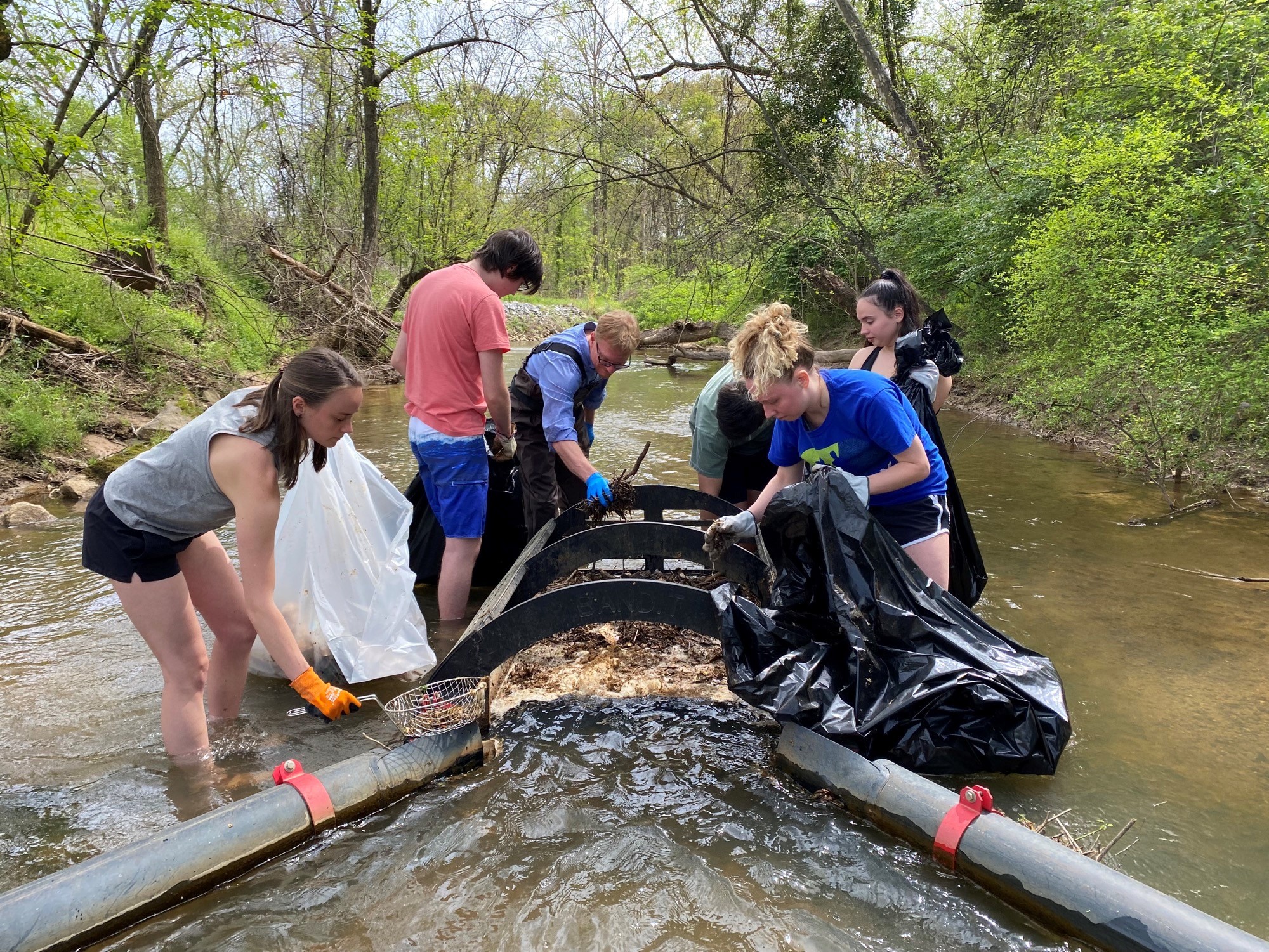
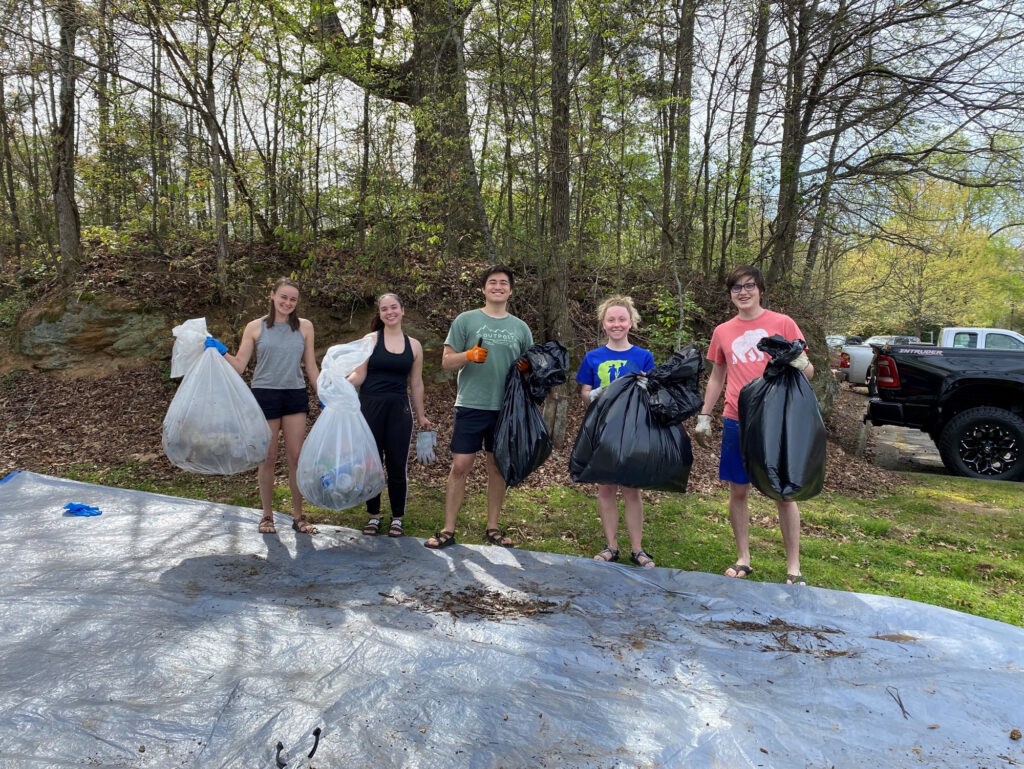
A third group collaborated with the UGA Office of Sustainability on the Pollinator Project, an effort to improve conditions for pollinators through research, education, outreach, and campus operations. This group restored existing pollinator gardens at Lake Herrick and Oconee Forest Park, and focused on outreach to promote the UGA Pollinator Census that took place on April 21-22. Team members researched different kinds of pollinators found on campus—carpenter bee, honeybee, bumblebee, and paper wasp—and their nesting habitat, characteristics, abundance, and seasonal presence. They created outreach materials, including posters and videos for use on social media, and tabled at the UGA Earth Day Fair and Market to generate interest in the event among UGA students. They tested and refined the online census tool and set up stations on North and South Campus to assist participants. The team worked with Dr. Carmen Blubaugh of the entomology department to develop online and printed guides to the native plants and pollinators participants were likely to see.
The Courtyard Garden
The final group, the Quad Squad, improved a section of the Ecology building’s central courtyard, which had become overgrown with river oats. Their goal was to create an aesthetically pleasing garden that supports native pollinators. “We hoped to not only increase species biodiversity, but to also create future educational possibilities,” said Sidney Jones, BS ’22.
The students gathered information about the courtyard’s physical attributes, its multiple uses, and factors like sun angles and access to water. They learned about native plant species and designed the garden to showcase different flowering heights and blooming times. They created informational signage and a comprehensive plant list. Perhaps most importantly, they worked with their stakeholders—in this case Assoc. Dean Jeb Byers, chair of the Odum School’s facilities committee, and the UGA Facilities Management Division grounds department—to shape the scope and scale of the project and acquire the necessary permissions.
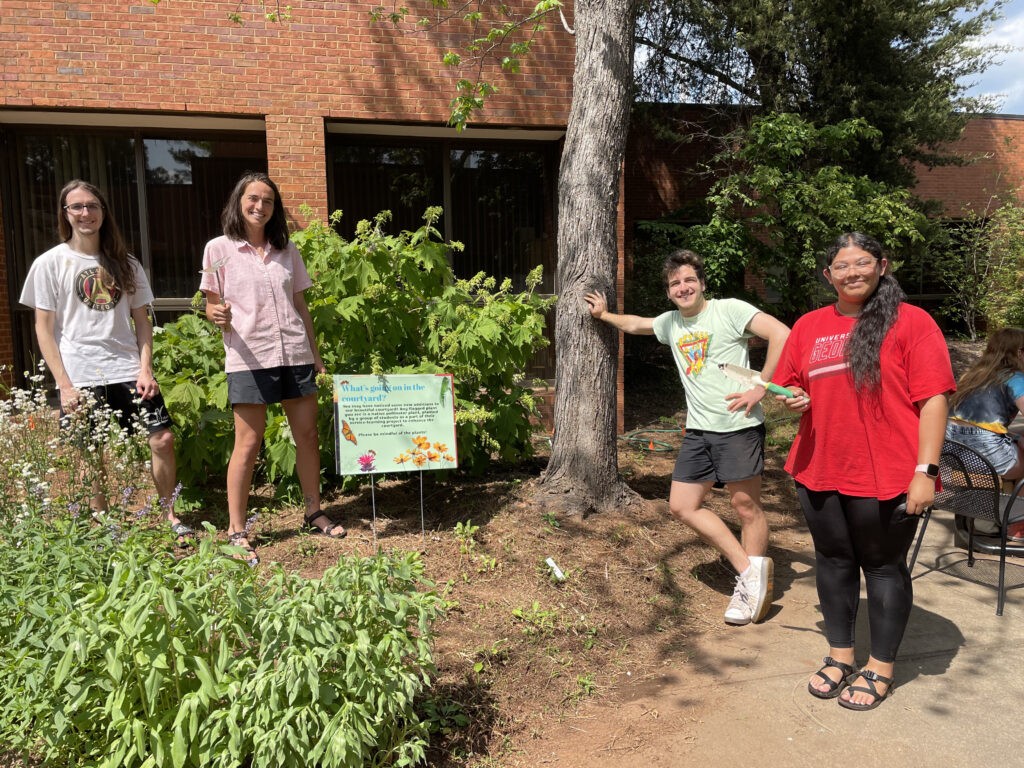
“We learned a lot about how to work within a system as complex as the university,” said Jesse Donck-Rains, AB ’22.
Although most of the Quad Squad graduated in May 2022, their project included provisions to ensure that the garden is maintained over the summer and beyond. They developed a long-term maintenance plan and proposed that the Odum School appoint an undergraduate Courtyard Champion each year who will be responsible for its upkeep.
As with each of the Practicum projects, the Quad Squad laid the groundwork for the next cohort of students to follow in their footsteps.
Byers, who attended the final class presentations, summed up the students’ impact on future classes. “It’s a nice proof of concept, and so there’s a potential next stage for the next group to come through to emulate what you guys have got the ball rolling on,” he said. “Thank you!”

